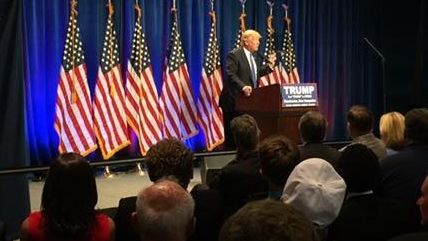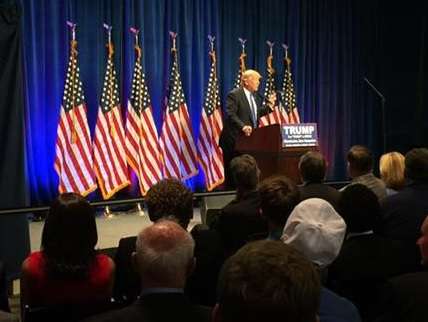Trump Takes Credit for Hillary Clinton Using 'Radical Islam,' Calls on Her to Return Saudi Donations
Says he wants a safe society that's tolerant and open and also railed against Muslim immigration.


Presumptive Republican nominee Donald Trump says that in the wake of the Orlando shooting, America "cannot afford to talk around the issue" of radical Islamist terrorism, re-iterating his call for a "temporary ban" on Muslim immigration, which he first proposed in December, and saying political correctness over the issue was crippling the country.
"I called for a ban after San Bernardino, and was met with great scorn and anger but now, many are saying I was right to do so, and although the pause is temporary, we must find out what is going on," Trump said in a speech in New Hampshire, according to his prepared remarks. "The ban will be lifted when we as a nation are in a position to properly and perfectly screen those people coming into our country."
While his official campaign website does not list the ban under any of his policy pages yet, and Trump has previously insisted the ban was "just a suggestion," today he appeared to lay out a proposal. He said that if elected he would "suspend immigration from areas of the world when there is a proven history of terrorism against the United States, Europe or our allies until we understand how to end these threats," pointing to U.S. immigration law, which grants the president that power.
Trump said he wanted a "full, impartial" security assessment of the immigration process, after which, he said, his putative administration would "develop a responsible immigration policy that serves the interests and values of America."
"With fifty people dead, and dozens more wounded, we cannot afford to talk around the issue anymore," Trump said. "We have to address it head on."
Trump noted that while the Orlando shooter was a U.S.-born citizen, his family emigrated from Afghanistan to the U.S. (in the 1980s). "The bottom line is that the only reason the killer was in America in the first place was because we allowed his family to come here," Trump said. "That is a fact, and it's a fact we need to talk about."
Trump said radical Islamist terrorism wasn't "just a national security issue" but also a "quality of life issue."
"If we want to protect the quality of life for all Americans—women and children, gay and straight, Jews and Christians and all people—then we need to tell the truth about Radical Islam," Trump said, saying "Radical Islam" was also "coming to our shores." The FBI has not uncovered direct contacts between the Orlando shooter and operatives of the Islamic State (ISIS) abroad.
Trump noted previous terrorist attacks, pointing out that the 9/11 hijackers came in on visas and, wrongly, claiming the Boston marathon bombers came in through political asylum. Instead the family came in on a tourist visa, which has less stringent requirements, and then applied for political asylum once here. He also mentioned the status of the San Bernardino shooter as the child of Pakistani immigrants, and that his wife, who also participated in the attack, came from Saudi Arabia on a visa.
He noted a Pew Research poll that found 99 percent of Afghans support sharia law, or law based on the Koran, as the official law of their country. "We admit many more from other countries in the region who share these same oppressive views," he insisted. "If we want to remain a free and open society, then we have to control our borders."
Trump then took credit for Hillary Clinton using the term "radical Islamism." Clinton said in an interview she would use the term instead of "radical jihad," which she said was the same. "Trump, as usual, is obsessed with name calling," she said.
Trump characterized Clinton's "solution" to terrorism as banning guns. "They tried that in France, which has among the toughest gun laws in the world, and 130 were brutally murdered by Islamic terrorists in cold blood," he pointed out. "Her plan is to disarm law-abiding Americans, abolishing the 2nd amendment, and leaving only the bad guys and terrorists with guns. She wants to take away Americans' guns, then admit the very people who want to slaughter us."
Much like Trump's manipulation of language, Clinton has not explicitly said she wants to overturn the Second Amendment but has signaled that she will pursue the kind of anti-gun measures that might not pass constitutional muster unless the amendment was repealed.
Trump insisted as president he would give the intelligence community, law enforcement, and the military "the tools they need to prevent terrorist attacks," including an intelligence-gathering system second to none" in which there would be increased cooperation among officials from different levels of government.
After retreading his rhetoric on immigration, he returned to the domestic war on terror. "I want us all to work together, including in partnership with our Muslim communities," Trump said, bringing up Muslims as Americans for the first time in the speech. "But Muslim communities must cooperate with law enforcement and turn in the people who they know are bad—and they do know where they are."
This "idea," such as it is, has been tried before. In New York City, Trump's hometown, police ran a massive surveillance operation targeting the Muslim communities in that city and in neighboring regions. That initially secret program did not yield a single lead before it was closed in 2014.
Trump also linked the Orlando shooting and radical Islamist terrorism to U.S. foreign policy. "America must do more, much more, to protect its citizens, especially people who are potential victims of crimes based on their backgrounds or sexual orientations," Trump said. "It also means we must change our foreign policy."
Trump rightly pointed out that the intervention in Libya, which Clinton proudly supported, and the decision to help overthrow the regime (U.S. air support helped Libyan rebels capture Col. Qaddafi, Libya's leader, who they then killed and over whose death Clinton gloated), as well as the U.S. push to overthrow the Assad regime in Syria, "created space for ISIS to expand and grow." While Trump criticized the Iraq war partially during the primary, he did not note its role in helping create ISIS in the first place. Trump also offered that the Iran nuclear deal, which he called "disastrous," was making it harder for the U.S. to work "in partnership with our Muslim allies in the region."
"That is why our new goal must be to defeat Islamic terrorism, not nation-building," Trump said. He also took credit for NATO announcing a new counter-terrorism initiative in recent weeks. Trump launched a critique of NATO in March centered on its ineffectiveness and its cost to the U.S. "The last major NATO mission was Hillary Clinton's war in Libya," Trump said. "That mission helped unleash ISIS on a new continent."
Claiming that the Iran deal jeopardized partnerships with regional Muslim allies, however, did not stop Trump from mocking Clinton for suggesting the U.S. call on Saudi Arabia, the largest Muslim "ally" in the region, to stop funding hate. Trump said he was calling on Clinton to return $25 million in donations the Clinton Foundation received from the Saudi government, which is on course to break its record for number of beheadings this year. Prosecutors in Saudi Arabia are also reportedly pushing for the use of the death penalty for homosexuality, which is illegal in the kingdom, because social media was turning people gay.
Given his (unsurprisingly) contradictory statements on Saudi Arabia (which is the Muslim ally most worried about the Iran deal), it's unclear what, if anything, Trump envisions his war on terror in the Middle East to look like.


Show Comments (291)